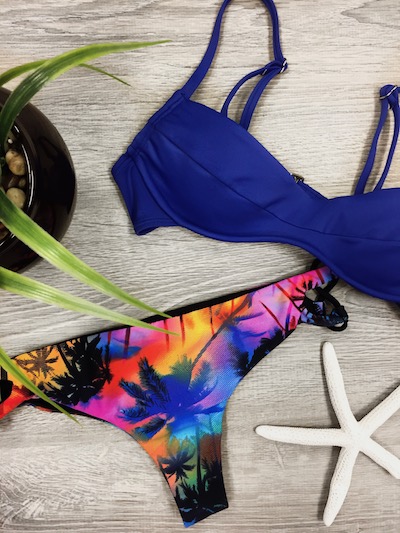Why You Shouldn't Buy "Fast Fashion" Bikinis
Oct 20th 2018
Let's face it: getting a "deal" on a cute bikini you see online is hard to resist, especially for those who live in Honolulu where it's bikini season all year round. Within the past decade or so, the concept of "fast fashion" has become the norm for consumers. So, what exactly is it, and why should you try to resist it?
"Fast Fashion," according to Merriam-Webster, is "an approach to the design, creation, and marketing of clothing fashions that emphasizes making fashion trends quickly and cheaply available to consumers." Many large retailers today are partaking in this concept, since it's "cheap" for them to make, and the retail rate is inexpensive and nearly irresistible for consumers. Not only is clothing apart of this, but bikinis have found their way into this realm as well. Let's take a look at some of the impacts that Fast Fashion has on the world:

1. Fast Fashion Is Actually Expensive
How, you might ask? Fast Fashion products are designed to be replaced quickly. These products don't last, so you end up purchasing more. Not only are you throwing money away when your FF bikini is worn out, but it ends up in a landfill where more than 13 trillion other tons of textile waste (per year) will sit while its dye chemicals leech into groundwater and soil (which is toxic for wildlife and humans).
2. Fast Fashion Is Detrimental To Women
There are 75 million people, a majority of which are in Third-World countries, that work in textile factories. Of this, 80% are young women, between 14 to 24. These women work over 12 hours per day and get paid extremely low wages.
3. Mother Nature Can't Stand Fast Fashion
The demand of Fast Fashion also demands natural resources, like water. Water is used to process textiles, and tons of it is used each day. Many countries are facing water shortages due to this demand. Since most of these countries where notorious Fast Fashion retailers are setting up shop have minimal environmental regulations, CO2 emissions will most likely increase by 60% within the next decade.
What Can You Do?
 To recap, it's actually better for your wallet and the environment to invest in a few, QUALITY swimsuits (and clothing), since they last longer. A local brand we carry at Born of the Water is Pualani Hawaii swimwear, and their products are extremely high-quality and will last for YEARS (we've had clients tell us they still wear bikini tops and bikini bottoms that they purchased 10+ years ago).
To recap, it's actually better for your wallet and the environment to invest in a few, QUALITY swimsuits (and clothing), since they last longer. A local brand we carry at Born of the Water is Pualani Hawaii swimwear, and their products are extremely high-quality and will last for YEARS (we've had clients tell us they still wear bikini tops and bikini bottoms that they purchased 10+ years ago).
A lot of companies are becoming aware of the pollution rates of textiles, so more brands than ever before produce items that are ecologically and ethically conscious! Don't be afraid to ask store associates questions about where their store's products come from, and how they're made. Pualani Hawaii, La Pearl Swim, Li'a Hawaii Handmade and Kainoa Nani Swimwear are just a few examples of ethically made brands we carry!
Have any thoughts on this topic? Feel free to send up an email so we can discuss it!
Until next time, #bowbabes xoxo
